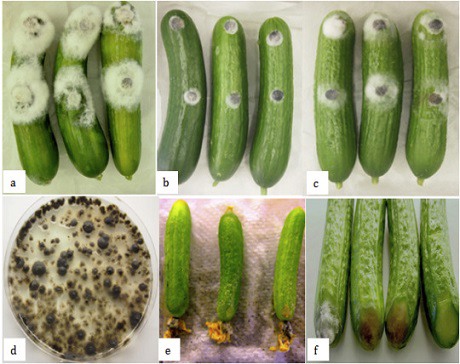The commercial greenhouse production of cucumber is limited by diseases, such as powdery mildew, Fusarium root and stem rot, Pythium crown and root rot, gummy stem blight. Scientists at Simon Fraser University (Burnaby, Canada) have evaluated the efficacy of the biological control agent Bacillus subtilis strain QST 713 (Rhapsody, containing 1 × 109 CFU/g) against foliar and root-infecting pathogens (Podosphaera xanthii, Fusarium oxysporum, Pythium aphanidermatum, Didymella bryoniae) on greenhouse-grown cucumbers in British Columbia, Canada.

For the study, Rhapsody was applied as a root drench or spray to leaves or flowers at a rate of 1.0 L product/100 L water, or in some experiments at 1.5 L product/100 L water. Applications were made 1 and 4 days prior to, as well as after, pathogen inoculation. Weekly foliar applications of Rhapsody significantly reduced powdery mildew colony development and showed eradicative effects on established leaf infections. Leaf area infected on untreated plants was 80–100% compared to 15–20% on Rhapsody-treated plants.
Rhapsody treatment made 1 and 4 days prior to Fusarium inoculation significantly improved plant growth after five weeks, while the treatments made 1 and 4 days post-inoculation were much less effective in preventing disease development. As regards Pithium rot, Rhapsody application did not significantly increase growth of Pythium-infected plants compared to the Pythium-only treatment. The inoculation with the gummy stem blight pathogen caused 24–30% post-harvest decay after fruit were incubated at 20–22°C for 7–10 days. Fruit infection was reduced by almost 55% when Rhapsody was applied 24 h prior to pathogen inoculation, while an application made 24 h after pathogen inoculation had no effect.
Scientists conclude that the preventive applications of Rhapsody are effective in reducing development of powdery mildew, Fusarium root and stem rot, and gummy stem blight on cucumber, while eradicative applications were effective against powdery mildew only. There was no effect observed against Pythium root rot.
Fonte: Zamir K. Punja, Ananchanok Tirajoh, Danielle Collyer, Li Ni, 'Efficacy of Bacillus subtilis strain QST 713 (Rhapsody) against four major diseases of greenhouse cucumbers', 2019, Crop Protection, Vol. 124.
